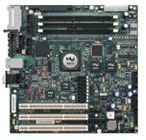Latest Intel I/O processors gain real-time Linux support
Dec 3, 2003 — by LinuxDevices Staff — from the LinuxDevices Archive — views TimeSys will deliver real-time embedded Linux support for Intel's newest generation of I/O processors, targeting high performance storage applications such as intelligent network adapter cards, RAID adapter cards, and network storage target devices. TimeSys says it has already delivered support for one high-end Intel I/O processor chip, and will add support for the latest Intel products soon after they reach generally availability.
TimeSys will deliver real-time embedded Linux support for Intel's newest generation of I/O processors, targeting high performance storage applications such as intelligent network adapter cards, RAID adapter cards, and network storage target devices. TimeSys says it has already delivered support for one high-end Intel I/O processor chip, and will add support for the latest Intel products soon after they reach generally availability.
(Click for larger view of Intel's IQ80321 development board)
The TimeSys Linux RTOS (real-time operating system) is packaged as a software development kit (SDK) that includes what TimeSys claims to be the industry's only single-kernel Linux real-time operating system. The SDK includes certified device drivers for all peripherals on the reference board, hundreds of Linux utilities and libraries, GNU toolchains, and TimeSys's Windows- and Linux-hosted TimeStorm integrated development environment (IDE).
TimeSys says it has already completed its port to the Intel's IOP321 I/O processor — the first of Intel's XScale based I/O processors to support the high-speed PCI-X interface — and it supports Intel's IQ80321 development board for the IOP321. The IOP321 targets SCSI adapter cards and RAID-on-Motherboard (ROMB) applications. It was launched in February, 2003.
TimeSys plans to ship SDKs for the very latest Intel I/O products — the IOP315 chipset and IOP331 SoC — soon after the IOP315's IQ80315 software development and processor evaluation kit, and the IOP331 I/O processor, respectively, reach general availability.
The IOP315 chipset targets network storage devices and intelligent network adapter cards for iSCSI, RAID5, IPv4, IPv6, and IPSec applications. It includes an IOP314 companion chip that provides peripherals interfaces to either one or two 80200 XScale processors. The companion chip can run at 200-, 400-, 600-, or 733-MHz, and dissipates under a watt of power at 600MHz, according to Intel. The chipset integrates “Application Accelerator Units in DMA” for RAID5 XOR and iSCSI CRC32C. More information about its development board, the IQ80315, is available here.

Intel's IQ80315 development board
The Intel IOP331 features a highly-integrated SoC design, with an 800 MHz XScale core, high-performance internal bus, dual-ported memory controller, and a high-bandwidth PCI-X to PCI-X Bridge. Target applications include PCI/PCI-X host-based adapters such as RAID cards, iSCSI cards, FC cards, Security/SSL NICs, and control plane and system controller applications utilizing PCI/PCI-X as a system interconnect. Other applications include backplane VPN (Virtual Private Network) devices, video servers, Network gateways, NAS (Network Attached Storage) and external storage arrays, PCI/PCI-X-based line cards for VoIP (Voice-over-IP) and routing, and more.
“We expect ready-to-run Linux support for the new Intel I/O processors to be an important option for our customers building next-generation storage systems,” commented Dave Boehmer, director of Applications and Platform Engineering for Intel's Storage Components Division.
TimeSys CEO Larry Weidman said, “Customers of Intel's new I/O processors who want to use Linux without sacrificing the reliability, performance, and benefits of commercial support can turn to TimeSys for a complete embedded Linux solution.”
This article was originally published on LinuxDevices.com and has been donated to the open source community by QuinStreet Inc. Please visit LinuxToday.com for up-to-date news and articles about Linux and open source.